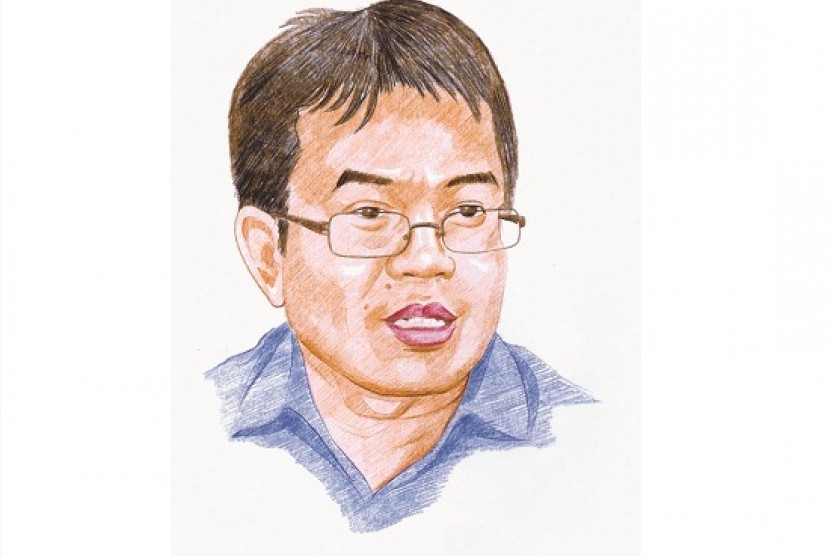REPUBLIKA.CO.ID, REPUBLIKA.CO.ID -- By, Yudi Latif
Democracy cannot be married in the wind. Trillions of money spent, lots of artificial institutions installed and various new procedures initiated do not make people more politically powerful. The hardware of democracy was successfully polished, but the software is still soulless in tyranny. Democracy is walking around leaving "demos" (the commoners), as Malin Kundang who forget his own mother.
Such an institution is the reminiscent of the failure of democracy in Indonesia back in the 1950s. According to Ricklefs view, the failure is caused by weak democratic foundations. He said that in a country that is still characterized by high levels of illiteracy, lack of education, poor economic conditions, wide social gap, and authoritarian mentality, the political realm is still the privilege of belonging to small elite of politicians.
This indicated that social reforms would never appear if it's only relying on political and economic institutional reforms, but reforms need to be rooted to earth culture. Cultural reform is a function of changes in collective social learning process, which brings transformation of values, ideas and way of life. In this case, it feels it is important to pay attention interwoven closely between culture, politics and economics, as something inseparable. Anthony Giddens (1984) warned that the concept of our culture is interactive. This approach assumed that instead of being separate from the economy, politics and society, a culture is medium of meaning which interacts with the other powers in all areas of life, including politics and economics."
Cultural democracy presupposes the existence of empathy and participation; namely the ability to understand and put yourself in the other person's situation, which became reason for willingness for active role in the resolution of collective problems. The ability of empathy and participation can be fostered by the power of literacy (Lerner, 1958).
World of orality is the world of concentration that leads to elitism. In the tradition of orality there are very few people who have access to resources. This scarcity confers special privileges to the few elite who make it politically dominant. The world literacy is the world of distribution. The expansion of literacy and the number of readings list encourage decentralization of knowledge mastery. This decentralization is slowly driven down the sacred elitism while strengthening egalitarianism.
Elitism contained mentality of self-centered narcissistic, without empathy and sincerity to invite participation. Egalitarianism contained equality of rights, thereby trying to prevent domination by promoting participation.
Not surprisingly, in a country with the strong tradition of literacy can grow a strong democracy. Athens (Greece) is often referred to as the "mother of democracy" because it is rooted in a strong tradition of literacy, thanks to the invention of the alphabet. Greek and Roman civilizations were the first on earth that's stand on the read-write community; was first equipped with the means of adequate expression in the world of writing; able to put the world's first writing in general circulation (Havelock,1982). Democratic revolution occurred in France (1848), not in the UK as a pioneer of the industrial revolution, as France (Paris) when it is the people with the highest literacy rate in Europe (Rude, 1970).
The most obvious illustration of contemporary Western democracies lies in the high degree of literacy. It is generally believed that the rising level of literacy of society leads to the emergence of the institutions of democratic social and rational; well on industrial development and economic growth. Conversely, a decline in literacy levels poses a threat to progress and democracy.
Historians try to describe the specifics of the relationship between literacy and social development in the West. Cipolla (1969) found that despite the historical pattern is not uniform, 'it seems clear that the real art of writing expressly relating to the condition of urbanization and commercial relationships." This correlation draw the conclusion that this was the cause of literacy development, a view that encourages the commitment of UNESCO to "eliminate illiteracy" in 2000 as a catalyst for modernization (Graff, 1986).
Literacy level and the breadth erudition society, especially in Indonesia, is currently under threat from a variety of directions. The first threat came from "new vokasionalisme" (new vocationalism), which is a utilitarian conception of educational institutions that emphasize technical skills. In this flow, it's ignoring the dimension of literacy, while giving excessive attention to grammatical and specific teaching in vocational disciplines.
This phenomenon gave birth to what is called Frank Furedi (2006) as "the cult of philistinism", the cult of cultural shallowness by excessive attention to material and practical interests. Universities and other educational institutions as a bulwark depth knowledge of intellectual excitement experienced pulverization process, undermined by the dominance of the ethos of managerialism and instrumentalism; an ethos that values the arts, culture and education as far as providing instrument to serve practical purposes. People who read literature and intellectual excitement waged risk being labeled as "elitist", "not grounded", and "marginal". The depth of knowledge and insight into humanity is avoided, superficiality is celebrated.
The second threat is in the form of deep and widespread exposure of multimedia, particularly television. In addition to bias against orality, surpassing everything in the country, when literacy traditions marginalized, given the strengthening of the culture of superficiality while weaken the functions of literacy.
Pressure on utilitarianism in the tradition of literacy and weaknesses of erudition gave inequality in public life. Political universe is flooded with politicians - builders, with the scarcity of politician-intellectual. Democracy required meritocracy blooded by meritocracy, paralyzing political sovereignty, economic independence, and personality nationwide.
Democracy must be rooted in the earth. Democracy can only flourish if literacy basis is available. Time to glorify literacy!


